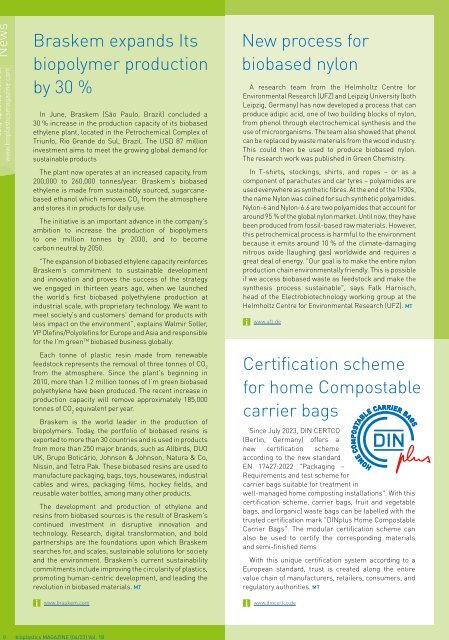Issue 04/2023
Highlights 100th issue Rebranding
Highlights
100th issue
Rebranding
You also want an ePaper? Increase the reach of your titles
YUMPU automatically turns print PDFs into web optimized ePapers that Google loves.
8 bioplastics MAGAZINE [<strong>04</strong>/23] Vol. 18<br />
News<br />
daily updated News at<br />
www.bioplasticsmagazine.com<br />
Braskem expands Its<br />
biopolymer production<br />
by 30 %<br />
In June, Braskem (São Paulo, Brazil) concluded a<br />
30 % increase in the production capacity of its biobased<br />
ethylene plant, located in the Petrochemical Complex of<br />
Triunfo, Rio Grande do Sul, Brazil. The USD 87 million<br />
investment aims to meet the growing global demand for<br />
sustainable products<br />
The plant now operates at an increased capacity, from<br />
200,000 to 260,000 tonnes/year. Braskem’s biobased<br />
ethylene is made from sustainably sourced, sugarcanebased<br />
ethanol which removes CO 2<br />
from the atmosphere<br />
and stores it in products for daily use.<br />
The initiative is an important advance in the company's<br />
ambition to increase the production of biopolymers<br />
to one million tonnes by 2030, and to become<br />
carbon neutral by 2050.<br />
"The expansion of biobased ethylene capacity reinforces<br />
Braskem’s commitment to sustainable development<br />
and innovation and proves the success of the strategy<br />
we engaged in thirteen years ago, when we launched<br />
the world’s first biobased polyethylene production at<br />
industrial scale, with proprietary technology. We want to<br />
meet society's and customers' demand for products with<br />
less impact on the environment”, explains Walmir Soller,<br />
VP Olefins/Polyolefins for Europe and Asia and responsible<br />
for the I’m green TM biobased business globally.<br />
Each tonne of plastic resin made from renewable<br />
feedstock represents the removal of three tonnes of CO 2<br />
from the atmosphere. Since the plant's beginning in<br />
2010, more than 1.2 million tonnes of I’m green biobased<br />
polyethylene have been produced. The recent increase in<br />
production capacity will remove approximately 185,000<br />
tonnes of CO 2<br />
equivalent per year.<br />
Braskem is the world leader in the production of<br />
biopolymers. Today, the portfolio of biobased resins is<br />
exported to more than 30 countries and is used in products<br />
from more than 250 major brands, such as Allbirds, DUO<br />
UK, Grupo Boticário, Johnson & Johnson, Natura & Co,<br />
Nissin, and Tetra Pak. These biobased resins are used to<br />
manufacture packaging, bags, toys, housewares, industrial<br />
cables and wires, packaging films, hockey fields, and<br />
reusable water bottles, among many other products.<br />
The development and production of ethylene and<br />
resins from biobased sources is the result of Braskem's<br />
continued investment in disruptive innovation and<br />
technology. Research, digital transformation, and bold<br />
partnerships are the foundations upon which Braskem<br />
searches for, and scales, sustainable solutions for society<br />
and the environment. Braskem’s current sustainability<br />
commitments include improving the circularity of plastics,<br />
promoting human-centric development, and leading the<br />
revolution in biobased materials. MT<br />
www.braskem.com<br />
New process for<br />
biobased nylon<br />
A research team from the Helmholtz Centre for<br />
Environmental Research (UFZ) and Leipzig University (both<br />
Leipzig, Germany) has now developed a process that can<br />
produce adipic acid, one of two building blocks of nylon,<br />
from phenol through electrochemical synthesis and the<br />
use of microorganisms. The team also showed that phenol<br />
can be replaced by waste materials from the wood industry.<br />
This could then be used to produce biobased nylon.<br />
The research work was published in Green Chemistry.<br />
In T-shirts, stockings, shirts, and ropes – or as a<br />
component of parachutes and car tyres – polyamides are<br />
used everywhere as synthetic fibres. At the end of the 1930s,<br />
the name Nylon was coined for such synthetic polyamides.<br />
Nylon-6 and Nylon-6.6 are two polyamides that account for<br />
around 95 % of the global nylon market. Until now, they have<br />
been produced from fossil-based raw materials. However,<br />
this petrochemical process is harmful to the environment<br />
because it emits around 10 % of the climate-damaging<br />
nitrous oxide (laughing gas) worldwide and requires a<br />
great deal of energy. "Our goal is to make the entire nylon<br />
production chain environmentally friendly. This is possible<br />
if we access biobased waste as feedstock and make the<br />
synthesis process sustainable", says Falk Harnisch,<br />
head of the Electrobiotechnology working group at the<br />
Helmholtz Centre for Environmental Research (UFZ). MT<br />
www.ufz.de<br />
Certification scheme<br />
for home Compostable<br />
carrier bags<br />
Since July <strong>2023</strong>, DIN CERTCO<br />
(Berlin, Germany) offers a<br />
new certification scheme<br />
according to the new standard<br />
EN 17427:2022 "Packaging –<br />
Requirements and test scheme for<br />
carrier bags suitable for treatment in<br />
well-managed home composting installations". With this<br />
certification scheme, carrier bags, fruit and vegetable<br />
bags, and (organic) waste bags can be labelled with the<br />
trusted certification mark "DINplus Home Compostable<br />
Carrier Bags". The modular certification scheme can<br />
also be used to certify the corresponding materials<br />
and semi-finished items<br />
With this unique certification system according to a<br />
European standard, trust is created along the entire<br />
value chain of manufacturers, retailers, consumers, and<br />
regulatory authorities. MT<br />
www.dincertco.de

















